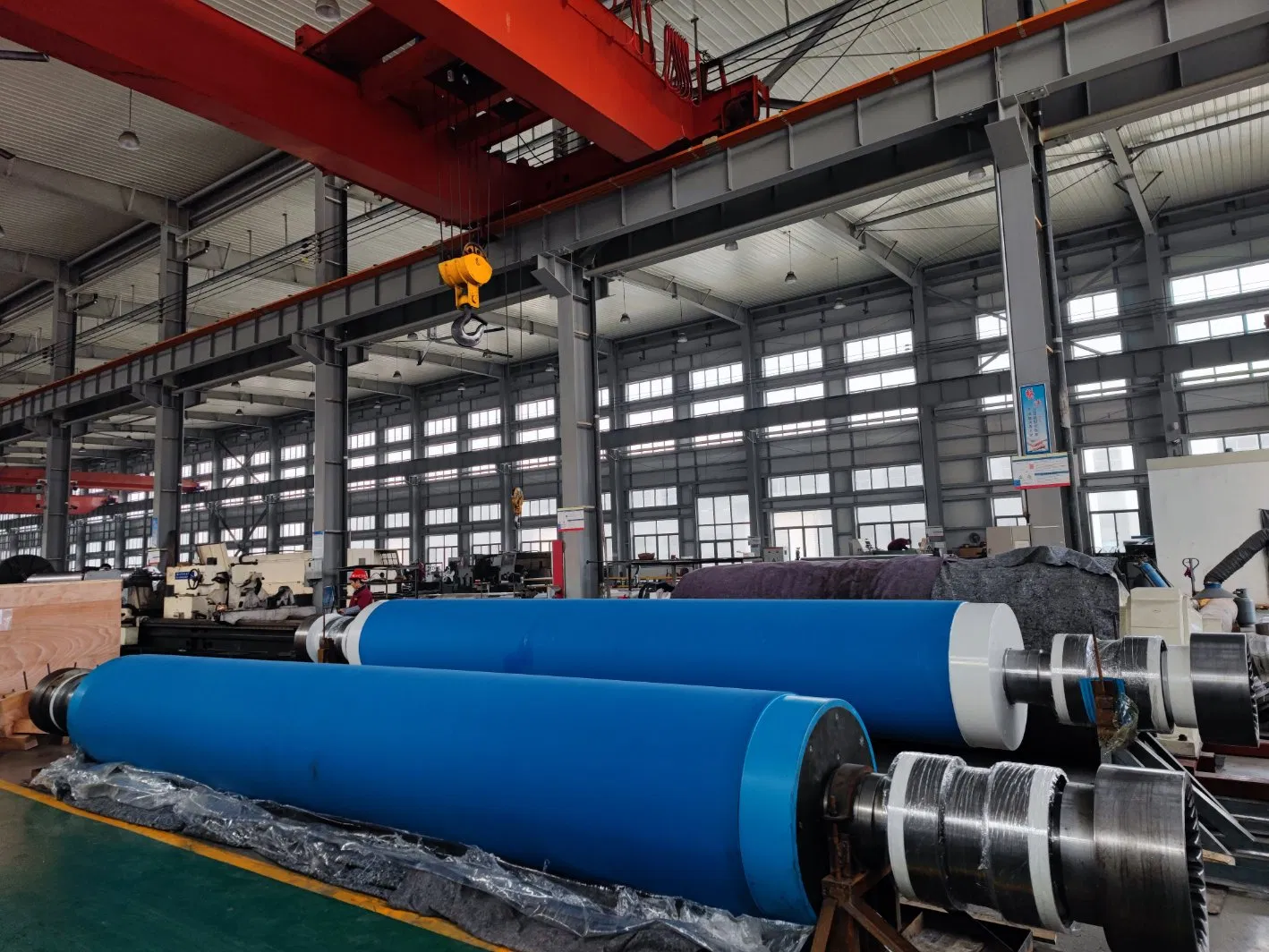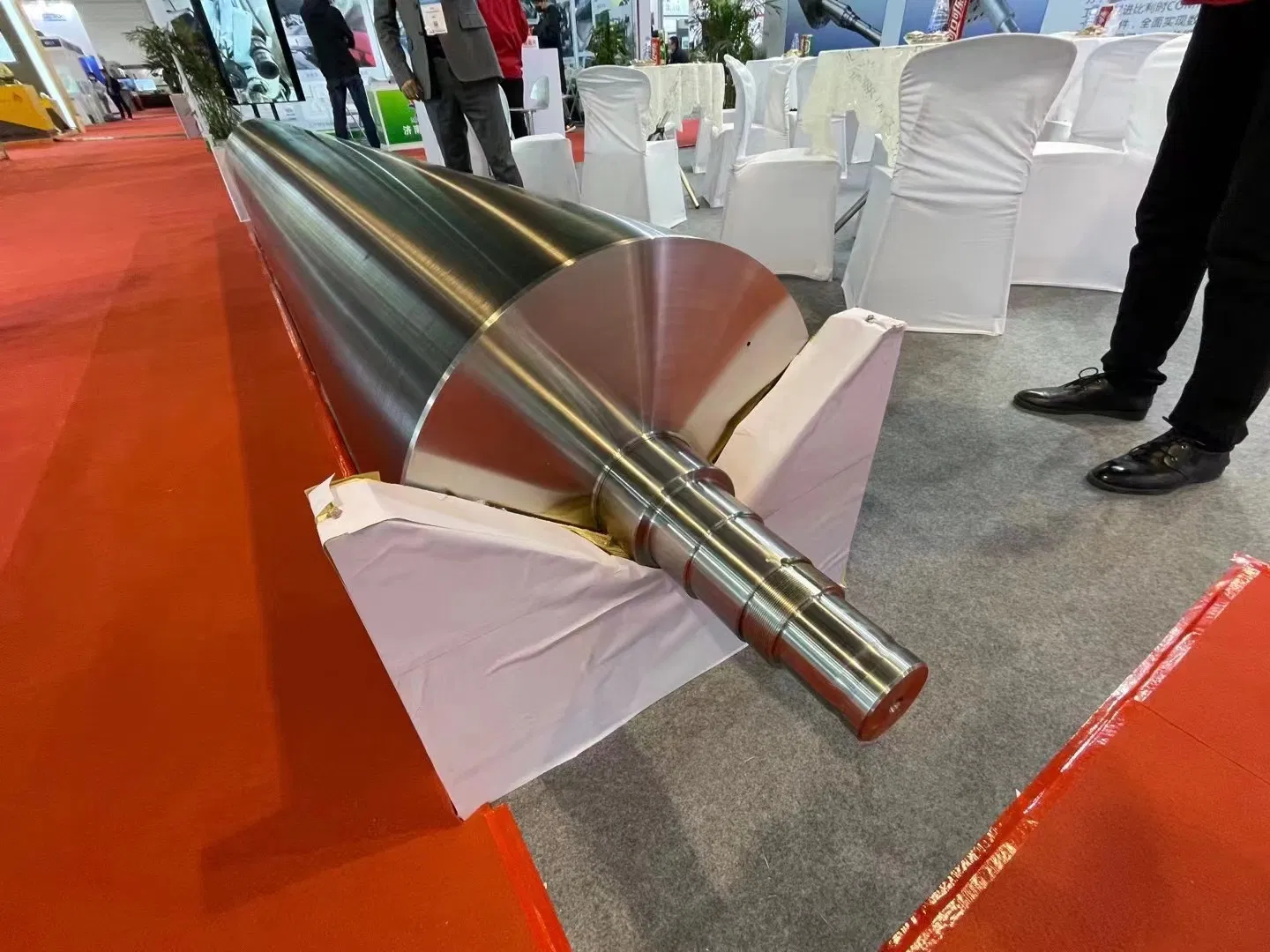Have you ever stopped to think about the intricate machinery that underpins modern industry? From the paper you read to the clothes you wear, and even the steel that forms our infrastructure, countless products rely on a seemingly simple yet profoundly complex component: the press roll. These cylindrical marvels are the silent workhorses, applying immense pressure and precision to transform raw materials into finished goods. And at the heart of their creation lies the expertise of a dedicated press roll manufacturer. Frankly speaking, without these specialists, many of the everyday items we take for granted simply wouldn't exist in their current form or quality.
In this comprehensive guide, we’ll delve deep into the world of press rolls, exploring their critical functions, the sophisticated processes involved in their creation, and what distinguishes a truly exceptional press roll manufacturer in today's competitive landscape. We'll uncover the secrets behind their durability, precision, and the vital role they play in ensuring operational efficiency across a myriad of sectors.
The Unsung Heroes of Industry: Understanding Press Rolls and Their Indispensable Role
At its core, a press roll is a cylindrical component designed to apply uniform pressure to a material as it passes between two or more rolls. While this definition sounds straightforward, the reality is far more nuanced. These rolls are engineered with incredible precision, often featuring specialized coatings, internal cooling or heating systems, and dynamic balancing to ensure flawless operation at high speeds and under extreme conditions.
Think about the paper industry, for instance. Here, press rolls are fundamental to dewatering the pulp, compacting the paper sheet, and imparting desired surface characteristics. In the textile industry, they're used for calendering, dyeing, and finishing fabrics. The printing world relies on them for transferring ink with pinpoint accuracy. Even in metal fabrication, heavy-duty press rolls are essential for shaping and flattening steel and other alloys.
The demands placed on these components are immense. They must withstand constant pressure, abrasion, chemical exposure, and often high temperatures, all while maintaining their precise dimensions and surface integrity. Any deviation can lead to product defects, costly downtime, and significant financial losses. This is precisely why the quality and reliability of these rolls are paramount, making the choice of your industrial roller supplier a decision of critical importance. In my experience, overlooking the quality of your rolls is akin to building a house on a shaky foundation – it’s only a matter of time before problems arise.
Why Precision Matters: The Impact on Production Quality and Efficiency
The precision of a press roll directly translates to the quality of the end product. A roll that is even slightly out of round, improperly balanced, or has an uneven surface can cause streaks, variations in thickness, or inconsistent finishes. For example, in the production of high-gloss paper, a microscopic imperfection on a calender roll can ruin an entire batch. Similarly, in the manufacturing of plastic films, uniform thickness is crucial, and only perfectly engineered rolls can achieve this.
Beyond quality, efficiency is another key driver. Rolls that wear out prematurely, require frequent maintenance, or cause machine vibrations lead to increased operational costs and reduced output. A high-quality roll, manufactured to exacting standards, ensures longer operational cycles, less downtime, and ultimately, a more productive and profitable manufacturing process. It's worth noting that the initial investment in a superior roll often pays for itself many times over through enhanced performance and longevity.
The Indispensable Role of a Specialized Press Roll Manufacturer
So, what exactly does a leading press roll manufacturer do? It’s far more than just machining a piece of metal into a cylinder. It involves a deep understanding of material science, mechanical engineering, fluid dynamics, and the specific application requirements of diverse industries. These manufacturers are not just suppliers; they are partners in innovation, often working closely with their clients to develop bespoke solutions for unique challenges.
A reputable manufacturer begins by understanding the client's operational environment. This includes factors like the type of material being processed, the speed of the line, operating temperatures, chemical exposure, and the desired end product characteristics. Based on this comprehensive assessment, they then recommend or design the optimal roll solution. This might involve selecting specific alloys for the core, choosing the right rubber or composite coating, and designing internal structures for cooling or heating.
Engineering Excellence: From Design to Delivery
The journey of a press roll from concept to completion is a testament to engineering excellence. It typically involves:
- Consultation & Design: Collaborating with clients to define specifications, followed by detailed CAD design and simulation.
- Material Selection: Choosing the right core material (e.g., steel, cast iron, aluminum) and surface material (e.g., rubber, polyurethane, chrome, ceramic, composite) based on application demands.
- Precision Machining: Using advanced CNC machines to achieve extremely tight tolerances for concentricity, parallelism, and surface finish.
- Coating & Covering: Applying specialized coatings or covers that provide desired properties like abrasion resistance, release characteristics, or chemical inertness. This is where expertise in materials like rubber, polymer, or hard chrome plating truly shines.
- Dynamic Balancing: Ensuring the roll rotates smoothly at high speeds without vibration, which is critical for product quality and machine longevity.
- Quality Control & Testing: Rigorous inspection throughout every stage, including ultrasonic testing, dimensional checks, hardness testing, and performance simulations.
This meticulous process ensures that every roll leaving the facility of a top-tier press roll manufacturer is ready to perform its demanding task flawlessly. It's a blend of traditional craftsmanship and cutting-edge technology.
Crafting Precision: The Manufacturing Process of High-Performance Press Rolls
The manufacturing of high-performance press rolls is a highly specialized art and science. It demands state-of-the-art facilities, skilled technicians, and an unwavering commitment to quality. Let's break down some of the key stages:
Core Fabrication and Machining
The process often begins with the selection of high-grade steel or cast iron for the roll core. This core is then precisely machined on large lathes to achieve the exact dimensions, taper, and surface finish required. Tolerances are often measured in microns, emphasizing the need for advanced machinery and experienced operators. Any imperfections at this stage will propagate through the subsequent processes, compromising the final product.
Once the core is machined, it undergoes rigorous inspection for dimensional accuracy, straightness, and surface integrity. This foundational step is absolutely critical, as the core provides the structural backbone for the entire roll.

Surface Treatment and Coating Application
This is arguably one of the most critical stages, as the surface of the roll directly interacts with the material being processed. Depending on the application, various treatments and coatings are applied:
- Rubber Covering: For applications requiring grip, elasticity, or chemical resistance (e.g., paper, textile, printing). The type of rubber (natural, synthetic, neoprene, EPDM, etc.) is carefully chosen based on hardness, temperature resistance, and chemical compatibility.
- Polyurethane Coating: Offers superior abrasion resistance and load-bearing capacity compared to rubber, often used in heavy-duty applications.
- Hard Chrome Plating: Provides excellent hardness, wear resistance, and corrosion protection, common in printing and metal processing.
- Ceramic Coatings: For extreme wear resistance, high temperatures, and non-stick properties.
- Composite Materials: Lightweight yet strong, offering unique properties for specific applications.
The application of these coatings is a highly controlled process, often involving specialized vulcanization ovens for rubber, electroplating baths for chrome, or thermal spray techniques for ceramics. The adhesion between the core and the coating must be flawless to prevent delamination under stress.
Grinding, Polishing, and Dynamic Balancing
After coating, the roll undergoes precision grinding to achieve the final diameter, concentricity, and surface finish. This step is crucial for ensuring uniform pressure distribution. Polishing may follow to achieve very smooth surfaces, especially for applications like film or foil production.
Finally, dynamic balancing is performed. This process ensures that the mass of the roll is evenly distributed around its axis of rotation. An unbalanced roll will vibrate excessively at high speeds, leading to premature bearing wear, machine damage, and product quality issues. Many experts agree that proper balancing is a non-negotiable aspect of custom press roll fabrication for optimal performance.
Beyond Paper: Diverse Applications and Types of Industrial Rollers
While the paper industry is a major user, press rolls are ubiquitous across a surprising range of sectors. The versatility of these components means that an experienced industrial roller supplier must possess a broad understanding of different industrial needs and challenges.
Applications Across Industries:
- Pulp & Paper: Press rolls, calender rolls, felt rolls, guide rolls, couch rolls – critical for dewatering, pressing, drying, and finishing paper.
- Textile: Squeeze rolls, dyeing rolls, calendering rolls – used for moisture removal, applying dyes and finishes, and imparting surface texture to fabrics.
- Plastics & Film: Nip rolls, chill rolls, laminating rolls – essential for extruding, calendering, and laminating plastic films and sheets with precise thickness and finish.
- Printing & Packaging: Ink rolls, impression rolls, anilox rolls – fundamental for transferring ink and applying pressure in various printing processes (offset, flexo, gravure).
- Metal Processing: Leveler rolls, pinch rolls, bridle rolls – used in steel mills and other metal fabrication plants for flattening, guiding, and tensioning metal sheets and coils.
- Food Processing: Specialized rolls for dough sheeting, conveying, and other food-grade applications, often requiring FDA-approved materials.
- Non-Wovens & Converting: Rolls for bonding, slitting, and winding various non-woven materials and converted products.

Specialized Roll Types:
Within these industries, countless specialized roll types exist, each designed for a specific function:
- Spreader Rolls: Designed to eliminate wrinkles and creases in webs.
- Bow Rolls (Expander Rolls): Used to spread or flatten a web, often with a bowed shape.
- Heat Transfer Rolls: Designed with internal channels for heating or cooling, crucial for temperature-sensitive processes.
- Grooved Rolls: Feature specific patterns or grooves for drainage, grip, or embossing.
- Vacuum Rolls: Incorporate internal vacuum systems for dewatering or holding materials.
The ability of a manufacturer to produce this wide array of specialized rolls, often requiring custom press roll fabrication, is a true indicator of their capability and experience.
Partnering for Success: How to Choose a Leading Press Roll Manufacturer
Selecting the right press roll manufacturer is not just about finding a supplier; it's about forming a strategic partnership that can significantly impact your operational efficiency, product quality, and bottom line. So, what should you look for when making this crucial decision?
Key Criteria for Selection:
- Experience and Expertise: Look for a manufacturer with a long track record and deep understanding of your specific industry and application. Their experience translates into fewer errors, better solutions, and reliable performance.
- Technological Capability: Do they use state-of-the-art machinery for machining, balancing, and coating? Are they investing in R&D for new materials and processes? Advanced technology is key to producing high-performance press rolls.
- Customization Capabilities: Can they design and manufacture rolls to your exact specifications, or do they only offer off-the-shelf solutions? True partners excel in custom press roll fabrication.
- Quality Control & Certifications: Inquire about their quality assurance processes. Do they have ISO certifications or other industry-specific accreditations? A robust QC system ensures consistent product quality.
- Material Science Knowledge: A top manufacturer will have profound knowledge of various materials – metals, rubbers, composites, ceramics – and their suitability for different applications. They should be able to advise on the best material for your specific needs.
- After-Sales Support & Service: What kind of support do they offer after the sale? This includes technical assistance, regrinding, re-covering, and repair services. A long-term relationship with an industrial roller supplier often includes ongoing maintenance.
- Lead Times and Reliability: Can they meet your production schedules? Timely delivery is crucial to avoid costly downtime.
- Reputation and References: What do their existing clients say? Ask for references or case studies to gauge their reliability and customer satisfaction.
To be honest, choosing a manufacturer based solely on price can be a costly mistake in the long run. The slight savings upfront can be quickly dwarfed by increased maintenance costs, production inefficiencies, and compromised product quality. I've found that investing in a quality partner pays dividends.
Have you ever considered the true cost of a cheap roll versus a premium one over its entire lifecycle? The difference in total cost of ownership can be staggering.
Innovation on a Roll: The Future of Press Roll Manufacturing
The world of press roll manufacturing is not static; it's constantly evolving with technological advancements and new industrial demands. The future promises even more sophisticated solutions, driven by trends like Industry 4.0, advanced materials, and sustainable manufacturing practices.
Emerging Trends and Technologies:
- Smart Rolls: Rolls equipped with integrated sensors for real-time monitoring of temperature, pressure, vibration, and wear. This data can be used for predictive maintenance, optimizing performance, and preventing failures.
- Advanced Materials: Development of new composite materials that offer superior strength-to-weight ratios, enhanced wear resistance, and improved chemical inertness, pushing the boundaries of roll performance.
- Additive Manufacturing (3D Printing): While not yet mainstream for large rolls, 3D printing could revolutionize the fabrication of complex internal structures for cooling or lightweighting, or for rapid prototyping of specialized roll designs.
- Sustainable Manufacturing: Focus on energy-efficient production processes, recycling of materials, and development of more environmentally friendly coatings and covers.
- AI and Machine Learning: Leveraging AI for predictive maintenance, optimizing grinding and balancing processes, and even for designing rolls based on performance data.
Interestingly enough, the evolution of the press roll manufacturer mirrors the broader industrial landscape. As industries become more automated, precise, and data-driven, so too must the components that power them. The manufacturers who embrace these innovations will be the leaders of tomorrow, continuing to provide the critical infrastructure for global production.
In conclusion, the role of a press roll manufacturer is far more significant than it might appear on the surface. They are the architects of precision, the guardians of quality, and the enablers of efficiency across countless industries. From the initial design to the final dynamic balancing, every step in the manufacturing process is a testament to meticulous engineering and unwavering dedication. Choosing the right partner in this field is not merely a procurement decision; it's an investment in the reliability, productivity, and success of your entire operation.
What aspects of press roll technology do you find most fascinating, and how do you think they will evolve further in the next decade?
For more detailed information, please visit our official website:Press roll manufacturer
About the author: Dr. Evelyn Reed is a seasoned industrial engineer with over two decades of experience specializing in precision manufacturing and material science. Her work focuses on optimizing production processes and component longevity in heavy industries. She frequently consults with leading manufacturers on advanced roller technologies and quality assurance, making her an authoritative voice on the critical role of industrial components like press rolls.


